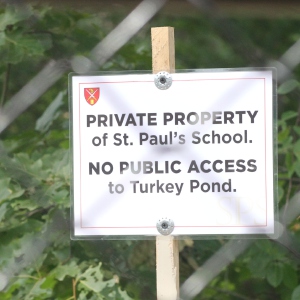‘What is the fastest, cheapest way we can get the school built’: Concord school board reconsidering middle school options
| Published: 12-05-2024 4:40 PM |
Concord’s school board is at a crossroads.
An election day vote threw plans to build a new middle school into the ringer, and the board now faces a variety of options about what to do next. None have officially been ruled out, but their once-fervent plan for a new school in East Concord has faded. Recent discussions largely circled around either an immediate decision to redirect plans to the South End or to hold a referendum of some kind.
Potential paths outlined by the board include: Continuing with plans to build at Broken Ground or immediately reversing course and creating designs to rebuild at Rundlett. They could hold a special election to ask the voters to choose a location or wait until city elections next November to ask voters to choose a location. They could renovate the current school or renovate the current school and also build a second, smaller middle school at Broken Ground. On the more extreme end, they could engage with Merrimack Valley about a “one city, one school district” model – or drop the project entirely.
The board voted last December, almost a year to the day before Wednesday’s meeting, to locate its new middle school in East Concord rather than rebuild it at its current location in the south end. On election day, roughly two-thirds of voters approved a change to the district charter that now requires the board to pass any relocation of a school in a referendum vote, throwing its plans to replace the current middle school, several years in the making, into uncertainty.
The board is awaiting more information about costs and timelines for each path before it proceeds. While no action was taken at a special meeting Wednesday, the meeting laid bare how disagreement over the location question, after a year of contention, has soured into resentment on all sides.
“I don’t really like going out in public anymore because of this,” said Sarah Robinson, a board member from East Concord. “We need a damn school, already. And this dragging out is obnoxious, and has been contentious for no reason; it has been really unprofessional and disappointing from so many individuals. I’m done dealing with it.”
According to the board’s legal counsel, they don’t.
Because the relocation decision had already been made prior to the new rule going into effect, it cannot be retroactively undone, according to Dean Eggert, the school board’s legal counsel. His analysis determined that the board could move forward with building a new school at Broken Ground as planned on solid legal footing.
Article continues after...
Yesterday's Most Read Articles
 New Concord apartments open in former First Congregational Church
New Concord apartments open in former First Congregational Church
 Inside EFAs: How school vouchers have fueled an enrollment boom at Christian schools across New Hampshire
Inside EFAs: How school vouchers have fueled an enrollment boom at Christian schools across New Hampshire
 St. Paul’s School won’t reopen public access to Turkey Pond
St. Paul’s School won’t reopen public access to Turkey Pond
 ‘Bittersweet’: The Post on Main Street closes Friday
‘Bittersweet’: The Post on Main Street closes Friday
 Goodwell Foods takes over Rustic Crust private label frozen pizza
Goodwell Foods takes over Rustic Crust private label frozen pizza
 Messy parking around Concord’s bus terminal won’t get less messy any time soon
Messy parking around Concord’s bus terminal won’t get less messy any time soon
“Amendment number one applies to all decisions to relocate schools made after June 30 of 2025. It does not apply retroactively to rescind the December 6, 2023 vote,” Eggert said.
However, he added, “We’re providing you with a legal opinion… I don’t provide you with business advice. I don’t provide you with political advice.”
Taking that path — charging ahead as planned — wasn’t officially voted down. But board discussion indicated most members see it as unwise — not only because they would seem to flout voters’ expressed wishes but also because they would likely land in court.
“Although I agree with his analysis of the retroactivity, I respect the vote I saw in November,” Board President Pamela Walsh said. “I think I would work personally from options coming out of that.”
Walsh’s comment aligned with ones she made at a candidate forum in October. Then running for re-election, she pledged to “honor” the amendments if they passed.
But, Wednesday night, the board didn’t reach a consensus on what honoring the vote really means.
On one hand, the amendments were written and advocated for by people who want a rebuild at Rundlett. They reiterated these thoughts, and opposition to the Broken Ground site, during public comment.
“Hopefully you got the message,” Debra Samaha said during public testimony. “Now, the public expects you to tell your legal counsel that you want to remain at Rundlett and not litigate or further delay… Now, the public expects you to take your thumb off the scale and do what you should have done years ago.”
At the same time, others countered, that may not be why all voters backed the rule change.
“Yes, the amendments passed with a supermajority. But they themselves were not a direct referendum on where the school should be placed. I know the Concerned Citizens folks want to paint it as a direct referendum, but that’s not what it was,” said Alex Streeter, a South End resident. Holding an election, he continued, “is the best way to find out what the constituents actually want.”
Streeter cited the findings of a Monitor survey done in October in which respondents were divided over where the school should go: 21% agreed with the board’s decision to move it to Broken Ground, 44% said they preferred the Rundlett location and 35% were undecided.
Notably, though, while the vast majority of residents who participated in the survey agreed with the general sentiment of the amendment, not everyone saw it as a direct referendum on the location. By contrast, only 35% of respondents said they felt the school board should reverse course now and rebuild at Rundlett.
At the polls on election day, many voters were unaware that the middle school question would appear on their ballot and told the Monitor they voted in support because of a literal reading of the amendment’s language. As one voter put it, “People should have a say.”
As soon as possible
Beyond the question of voter intent, some district parents both in the audience and on the board wanted to ensure student needs weren’t overshadowed.
For board member Cara Meeker, the best thing for the district is a new school as soon as possible — wherever it goes.
“I’m thinking about this in terms of what is the fastest, cheapest way we can get the school built — a new school, at this juncture. With our options, rescinding the vote and moving it back to Rundlett is the only option that doesn’t make us wait for a vote in November and doesn’t put us at high risk of litigation,” she said. “I think we need to recognize that it’s possible that’s the fastest option.”
During public comment, Nicole Fox similarly urged the board to move forward.
While she pushed for the board to choose Rundlett a year ago, Fox said her primary goal is a new school as soon as possible — and she put in a lot of volunteer hours on committees for this project to make that happen. She didn’t want the amendments to pass because she feared their associated delays. But they did.
“It’s really hard for me to look at you guys and have you say that this the community does not want the school built at Rundlett, even now,” Fox said. “That’s what they want. They voted. You can have another election, but it’s not going to change the outcome.”
“Anything else,” she concluded, “is really just ignoring the voters and wasting time.”
To make their decision, board members wanted more information about what the timeline and associated costs would be for each option they have now. Walsh requested a report to be presented and weighed at a future meeting, likely in January.
Everything costs money
Members of the school board and the concerned citizens’ group that has criticized it over the last year both feel that neither party has listened to — or is willing to listen to — the other.
Wednesday, as in the past, speakers criticized the board for not reconsidering the location debate sooner, described the project as an extravagance and accused the board of concealing important financial information and skewing the facts about site comparisons. Meanwhile, members of the board expressed frustration that what they saw as a genuine pursuit of what is best for Concord schools had not resonated.
“At this point, there’s no way that we’re able to have a conversation. I don’t feel like any information that I give in good faith is taken as being given in good faith,” Robinson said. “I think it really doesn’t matter how much more information we provide — people have made up their minds.”
For Robinson, the deadlock has taken its toll.
“Children have been completely written out of this conversation, for the most part,” she continued. “I thought for sure at one point, ‘okay, we’re gonna get through this. We’re gonna have an awesome school for kids’ — My children will never walk through those doors.”
From timelines to price tags to the availability or not of state building aid, uncertainty about this project looms, Meeker noted. But, she continued, the board has a decision to make.
“I don’t want to throw in the towel. I want to continue to advocate for all of the possible resources that we can get in this process. I don’t want to give up. I don’t want to assume we’re not getting a new school. I don’t want to assume we’re not going to move forward with what is best for our kids,” she said. “This is our city. These are our kids. These are our families. Everything costs money. That’s how our community is run. It’s how it’s built… I don’t necessarily want to drag it out, but I want to have the information so that we can make a decision, and then we just keep going.”
Catherine McLaughlin can be reached at cmclaughlin@cmonitor.com









 Bow offers water to Hooksett plant, asks Concord to help fix its supply
Bow offers water to Hooksett plant, asks Concord to help fix its supply Hyper-local, good-news-only paper in Andover is closing
Hyper-local, good-news-only paper in Andover is closing Concord Christian Academy celebrates accomplishment and faith at graduation ceremony
Concord Christian Academy celebrates accomplishment and faith at graduation ceremony
